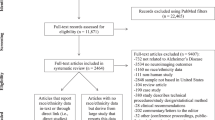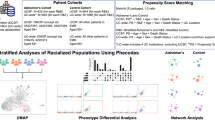Abstract
Research on racial differences in Alzheimer disease (AD) dementia has increased in recent years. Older African American individuals bear a disproportionate burden of AD and cognitive impairment compared with non-Latino white individuals. Tremendous progress has been made over the past two decades in our understanding of the neurobiological substrates of AD. However, owing to well-documented challenges of study participant recruitment and a persistent lack of biological data in the African American population, knowledge of the drivers of these racial disparities has lagged behind. Therapeutic targets and effective interventions for AD are increasingly sought, but without a better understanding of the disease in African American individuals, any identified treatments and/or cures will evade this rapidly growing at-risk population. In this Perspective, I introduce three key obstacles to progress in understanding racial differences in AD: uncertainty about diagnostic criteria, disparate cross-sectional and longitudinal findings; and a dearth of neuropathological data. I also highlight evidence-informed strategies to move the field forward.
This is a preview of subscription content, access via your institution
Access options
Access Nature and 54 other Nature Portfolio journals
Get Nature+, our best-value online-access subscription
$32.99 / 30 days
cancel any time
Subscribe to this journal
Receive 12 print issues and online access
$189.00 per year
only $15.75 per issue
Buy this article
- Purchase on SpringerLink
- Instant access to the full article PDF.
USD 39.95
Prices may be subject to local taxes which are calculated during checkout
Similar content being viewed by others
References
[No authors listed] 2020 Alzheimer’s disease facts and figures. Alzheimers Dement. 16, 391–460 (2020).
Rovner, B. W., Casten, R. J. & Harris, L. F. Cultural diversity and views on Alzheimer disease in older African Americans. Alzheimer Dis. Assoc. Disord. 27, 133–137 (2013).
Mayeda, E. R., Glymour, M. M., Quesenberry, C. P. & Whitmer, R. A. Inequalities in dementia incidence between six racial and ethnic groups over 14 years. Alzheimers Dement. 12, 216–224 (2016).
Brewster, P. et al. Progress and future challenges in aging and diversity research in the United States. Alzheimers Dement. 15, 995–1003 (2019).
Rajan, K. B., Weuve, J., Barnes, L. L., Wilson, R. S. & Evans, D. A. Prevalence and incidence of clinically diagnosed Alzheimer’s disease dementia from 1994 to 2012 in a population study. Alzheimers Dement. 15, 1–7 (2019).
Barnes, L. L. & Bennett, D. A. Alzheimer’s disease in African Americans: risk factors and challenges for the future. Health Aff. 33, 580–586 (2014).
Chin, A. L., Negash, S., Xie, S., Arnold, S. E. & Hamilton, R. Quality, and not just quantity, of education accounts for differences in psychometric performance between African Americans and white non-Hispanics with Alzheimer’s disease. J. Int. Neuropsychol. Soc. 18, 277–285 (2012).
Williams, D. R. Race and health: basic questions, emerging directions. Ann. Epidemiol. 7, 322–333 (1997).
Zuelsdorff, M., Barnes, L. L., & Okonkwo, O. C. In Clinical Cultural Neuroscience: An Integrative Approach to Cross-Cultural Neuropsychology (ed. Pedraza, O.) 233–251 (Oxford Univ. Press, 2020).
Kunkle, B. W. et al. Novel Alzheimer disease risk loci and pathways in African American individuals using the African Genome Resources Panel: a meta-analysis. JAMA Neurol. 78, 102–113 (2021).
Hohman, T. J. et al. Global and local ancestry in African-Americans: implications for Alzheimer’s disease risk. Alzheimers Dement. 12, 233–243 (2016).
Reitz, C. & Mayeux, R. Genetics of Alzheimer’s disease in Caribbean Hispanic and African American populations. Biol. Psychiatry 75, 534–541 (2014).
Babulal, G. M. et al. Perspectives on ethnic and racial disparities in Alzheimer’s disease and related dementias: update and areas of immediate need. Alzheimers Dement. 15, 292–312 (2019).
Lind, K. E. et al. Effect of Medicare part D on ethnoracial disparities in antidementia medication use. J. Am. Geriatr. Soc. 66, 1760–1767 (2018).
Arvanitakis, Z., Shah, R. C. & Bennett, D. A. Diagnosis and management of dementia: review. JAMA 322, 1589–1599 (2019).
Zahodne, L. B., Manly, J. J., Azar, M., Brickman, A. M. & Glymour, M. M. Racial disparities in cognitive performance in mid- and late adulthood: analyses of two cohort studies. J. Am. Geriatr. Soc. 64, 959–964 (2016).
Wilson, R. S., Capuano, A. W., Sytsma, J., Bennett, D. A. & Barnes, L. L. Cognitive aging in older Black and White persons. Psychol. Aging 30, 279–285 (2015).
Gross, A. L. et al. Effects of education and race on cognitive decline: an integrative study of generalizability versus study-specific results. Psychol. Aging 30, 863–880 (2015).
Nelson, P. T. et al. Correlation of Alzheimer disease neuropathologic changes with cognitive status: a review of the literature. J. Neuropathol. Exp. Neurol. 71, 362–381 (2012).
Campbell, A. L. et al. Caveats in the neuropsychological assessment of African Americans. J. Natl. Med. Assoc. 94, 591–601 (2002).
Wright, R. S. et al. Multiple influences on cognitive function among urban-dwelling African Americans. J. Racial Ethn. Health Disparities 6, 851–860 (2019).
Fyffe, D. C. et al. Explaining differences in episodic memory performance among older African Americans and Whites: the roles of factors related to cognitive reserve and test bias. J. Int. Neuropsychol. Soc. 17, 625–638 (2011).
Kittner, S. J. et al. Methodological issues in screening for dementia: the problem of education adjustment. J. Chronic Dis. 39, 163–170 (1986).
Rivera Mindt, M., Byrd, D., Saez, P. & Manly, J. Increasing culturally competent neuropsychological services for ethnic minority populations: a call to action. Clin. Neuropsychol. 24, 429–453 (2010).
Lamar, M. et al. Relationship of early-life residence and educational experience to level and change in cognitive functioning: results of the minority aging research study. J. Gerontol. B Psychol. Sci. Soc. Sci. 75, e81–e92 (2020).
Barnes, L. L. et al. Perceived discrimination and cognition in older African Americans. J. Int. Neuropsychol. Soc. 18, 856–865 (2012).
Turner, A. D., James, B. D., Capuano, A. W., Aggarwal, N. T. & Barnes, L. L. Perceived stress and cognitive decline in different cognitive domains in a cohort of older African Americans. Am. J. Geriatr. Psychiatry 25, 25–34 (2017).
Vonk, J. M. J. et al. Secular trends in cognitive trajectories of diverse older adults. Alzheimers Dement. 15, 1576–1587 (2019).
Zahodne, L. B., Sol, K. & Kraal, Z. Psychosocial pathways to racial/ethnic inequalities in late-life memory trajectories. J. Gerontol. B Psychol. Sci. Soc. Sci. 74, 409–418 (2019).
Manly, J. J., Jacobs, D. M., Touradji, P., Small, S. A. & Stern, Y. Reading level attenuates differences in neuropsychological test performance between African American and White elders. J. Int. Neuropsychol. Soc. 8, 341–348 (2002).
Manly, J. J., Byrd, D. A., Touradji, P. & Stern, Y. Acculturation, reading level, and neuropsychological test performance among African American elders. Appl. Neuropsychol. 11, 37–46 (2004).
Sisco, S. et al. The role of early-life educational quality and literacy in explaining racial disparities in cognition in late life. J. Gerontol. B Psychol. Sci. Soc. Sci. 70, 557–567 (2015).
Manly, J. J. Deconstructing race and ethnicity: implications for measurement of health outcomes. Med. Care. 44 (Suppl. 3), 10–16 (2006).
Avila, J. F. et al. Education differentially contributes to cognitive reserve across racial/ethnic groups. Alzheimers Dement. 17, 70–80 (2021).
Barnes, L. L. et al. Racial differences in the progression of cognitive decline in Alzheimer disease. Am. J. Geriatr. Psychiatry 13, 959–967 (2005).
Vos, S. J. B. et al. Preclinical Alzheimer’s disease and its outcome: a longitudinal cohort study. Lancet Neurol. 12, 957–965 (2013).
Castora-Binkley, M., Peronto, C. L., Edwards, J. D. & Small, B. J. A longitudinal analysis of the influence of race on cognitive performance. J. Gerontol. B Psychol. Sci. Soc. Sci. 70, 512–518 (2015).
Marsiske, M. et al. Race-related disparities in 5-year cognitive level and change in untrained ACTIVE participants. J. Aging Health 25 (Suppl.), 103–127 (2013).
Masel, M. C. & Peek, M. K. Ethnic differences in cognitive function over time. Ann. Epidemiol. 19, 778–783 (2009).
Sawyer, K., Sachs-Ericsson, N., Preacher, K. J. & Blazer, D. G. Racial differences in the influence of the APOEepsilon 4 allele on cognitive decline in a sample of community-dwelling older adults. Gerontology 55, 32–40 (2009).
Byrd, D. R., Gee, G. C. & Tarraf, W. Black-white mental status trajectories: what ages do differences emerge? SSM Popul. Health 6, 169–177 (2018).
Sachs-Ericsson, N. & Blazer, D. G. Racial differences in cognitive decline in a sample of community dwelling older adults: the mediating role of education and literacy. Am. J. Geriatr. Psychiatry 13, 968–975 (2005).
Amariglio, R. E. et al. Examining cognitive decline across black and white participants in the Harvard Aging Brain Study. J. Alzheimers Dis. 75, 1437–1446 (2020).
Weuve, J. et al. Cognitive aging in black and white Americans: cognition, cognitive decline, and incidence of Alzheimer disease dementia. Epidemiology 29, 151–159 (2018).
Early, D. R. et al. Demographic predictors of cognitive change in ethnically diverse older persons. Psychol. Aging 28, 633–645 (2013).
Karlamangla, A. S. et al. Trajectories of cognitive function in late life in the United States: demographic and socioeconomic predictors. Am. J. Epidemiol. 170, 331–342 (2009).
Sloan, F. A. & Wang, J. Disparities among older adults in measures of cognitive function by race or ethnicity. J. Gerontol. 60, 242–250 (2005).
Mayeda, E. R., Filshtein, T. J., Tripodis, Y., Glymour, M. M. & Gross, A. L. Does selective survival before study enrolment attenuate estimated effects of education on rate of cognitive decline in older adults? A simulation approach for quantifying survival bias in life course epidemiology. Int. J. Epidemiol. 47, 1507–1517 (2018).
Gleason, C. E. et al. Association between enrollment factors and incident cognitive impairment in Blacks and Whites: data from the Alzheimer’s Disease Center. Alzheimers Dement. 15, 1533–1545 (2019).
Gilmore-Bykovskyi, A. L. et al. Recruitment and retention of underrepresented populations in Alzheimer’s disease research: a systematic review. Alzheimers Dement. 19, 751–770 (2019).
de la Monte, S. M., Hutchins, G. M. & Moore, G. W. Racial differences in the etiology of dementia and frequency of Alzheimer lesions in the brain. J. Natl. Med. Assoc. 81, 644–652 (1989).
Sandberg, G., Stewart, W., Smialek, J. & Troncoso, J. C. The prevalence of the neuropathological lesions of Alzheimer’s disease is independent of race and gender. Neurobiol. Aging 22, 169–175 (2001).
Miller, F. D., Hicks, S. P., D’Amato, C. J. & Landis, J. R. A descriptive study of neuritic plaques and neurofibrillary tangles in an autopsy population. Am. J. Epidemiol. 120, 331–341 (1984).
Bonner, G. J., Darkwa, O. K. & Gorelick, P. B. Autopsy recruitment program for African Americans. Alzheimer Dis. Dis. Assoc. Disord. 14, 202–208 (2000).
Wilkins, C. H., Grant, E. A., Schmitt, S. E., McKeel, D. W. & Morris, J. C. The neuropathology of Alzheimer disease in African American and White individuals. Arch. Neurol. 63, 87–90 (2006).
Riudavets, M. A. et al. The prevalence of Alzheimer neuropathologic lesions is similar in blacks and whites. J. Neuropathol. Exp. Neurol. 65, 1143–1148 (2006).
Pytel, P. et al. Vascular and Alzheimer-type pathology in an autopsy study of African Americans. Neurology 66, 433–435 (2006).
Barnes, L. L. et al. Mixed pathology is more likely in black than white decedents with Alzheimer dementia. Neurology 85, 528–534 (2015).
Graff-Radford, N. R., Besser, L. M., Crook, J. E., Kukull, W. A. & Dickson, D. W. Neuropathologic differences by race from the national Alzheimer’s coordinating center. Alzheimers Dement. 12, 669–677 (2016).
Snowden, L. R. & Graaf, G. COVID-19, social determinants past, present, and future, and African Americans’ health. J. Racial Ethn. Health Disparities 8, 12–20 (2021).
Nag, S. et al. Limbic-predominant age-related TDP-43 encephalopathy in Black and White decedents. Neurology 95, e2056–e2064 (2020).
Howell, J. C. et al. Race modifies the relationship between cognition and Alzheimer’s disease cerebrospinal fluid biomarkers. Alzheimers Res. Ther. 9, 88 (2017).
Garrett, S. L. et al. Racial disparity in cerebrospinal fluid amyloid and tau biomarkers and associated cutoffs for mild cognitive impairment. JAMA Netw. Open 2, e1917363 (2019).
Morris, J. C. et al. Assessment of racial disparities in biomarkers for Alzheimer disease. JAMA Neurol. 76, 264–273 (2019).
Kumar, V. V. et al. Baseline results: the association between cardiovascular risk and preclinical Alzheimer’s disease pathology (ASCEND) study. J. Alzhiemers Dis. 75, 109–117 (2020).
Meeker, K. L. et al. Socioeconomic status mediates racial differences seen using the AT(N) framework. Ann. Neurol. 89, 254–265 (2020).
Brickman, A. M. et al. Plasma p-tau181, p-tau217, and other blood-based Alzheimer’s disease biomarkers in a multi-ethnic, community study. Alzheimers Dement. 17, 1353–1364 (2021).
Rajan, K. B. et al. Remote blood biomarkers of longitudinal cognitive outcomes in a population study. Ann. Neurol. 88, 1065–1076 (2020).
Gottesman, R. F. et al. The ARIC-PET amyloid imaging study: brain amyloid differences by age, race, sex, and APOE. Neurology 87, 473–480 (2016).
Blazel, M. M. et al. Factors associated with lumbar puncture participation in Alzheimer’s disease research. J. Alzheimers Dis. 77, 1559–1567 (2020).
Denny, A. et al. Perspective on the “African American participation in Alzheimer disease research: Effective strategies” workshop, 2018. Alzheimers Dement. 16, 1734–1744 (2020).
Barnes, L. L., Shah, R. C., Aggarwal, N. T., Bennett, D. A. & Schneider, J. A. The Minority Aging Research Study: ongoing efforts to obtain brain donation in African Americans without dementia. Curr. Alzheimer Res. 9, 734–745 (2012).
Robinson, R. A. S. et al. Framework for creating storytelling materials to promote African American/Black adult enrollment in research on Alzheimer’s disease and related disorders. Alzheimers Dement. 6, e12076 (2020).
Croff, R. L. et al. Things are changing so fast: integrative technology for preserving cognitive health and community history. Gerontologist 59, 147–157 (2019).
Child, S. T. et al. ‘We need a safe, walkable way to connect our sisters and brothers’: a qualitative study of opportunities and challenges for neighborhood-based physical activity among residents of low-income African-American communities. Ethn. Health 24, 353–364 (2019).
Green-Harris, G. et al. Addressing disparities in Alzheimer’s disease and African-American participation in research: an asset-based community development approach. Front. Aging Neurosci. 11, 125 (2019).
Johnson, J. K. et al. Study protocol for a cluster randomized trial of the Community of Voices choir intervention to promote the health and well-being of diverse older adults. BMC Public. Health 15, 1049 (2015).
Glover, C. M., Shah, R. C., Bennett, D. A., Wilson, R. S. & Barnes, L. L. The health equity through aging research and discussion (HEARD) study: a proposed two-phase sequential mixed-methods research design to understand barriers and facilitators of brain donation among diverse older adults. Exp. Aging Res. 46, 311–322 (2020).
Glover, C. M., Shah, R. C., Bennett, D. A., Wilson, R. S. & Barnes, L. L. Perceived impediments to completed brain autopsies among diverse older adults who have signed a uniform anatomical gift act for brain donation for clinical research. Ethn. Dis. 30, 709–718 (2020).
Thornton, R. L. et al. Evaluating strategies for reducing health disparities by addressing the social determinants of health. Health Aff. 35, 1416–1423 (2016).
Bailey, Z. D., Feldman, J. M. & Bassett, M. T. How structural racism works – racist policies as a root cause of U.S. racial health inequities. N. Engl. J. Med. 384, 768–773 (2020).
Massey, D. S. & Denton, N. A. American Apartheid: Segregation and the Making of the Underclass (Harvard Univ. Press, 1993).
Brown, S. C. et al. Neighborhood greenness and chronic health conditions in Medicare beneficiaries. Am. J. Prev. Med. 51, 78–89 (2016).
Pool, L. R. et al. Longitudinal associations of neighborhood-level racial residential segregation with obesity among blacks. Epidemiology 29, 207–214 (2018).
Kershaw, K. N. et al. Association of changes in neighborhood-level racial residential segregation with changes in blood pressure among black adults: the CARDIA study. JAMA Intern. Med. 177, 996–1002 (2017).
Hunt, J. F. V. et al. Association of neighborhood-level disadvantage with cerebral and hippocampal volume. JAMA Neurol. 77, 451–460 (2020).
Caunca, M. R. et al. Association of racial residential segregation throughout young adulthood and cognitive performance in middle-aged participants in the CARDIA study. JAMA Neurol. 77, 1000–1007 (2020).
Ferraro, K. F. & Farmer, M. M. Double jeopardy, aging as leveler, or persistent health inequality? A longitudinal analysis of white and black Americans. J. Gerontol. B Psychol. Sci. Soc. Sci. 51, S319–S328 (1996).
Geronimus, A. T. Deep integration: letting the epigenome out of the bottle without losing sight of the structural origins of population health. Am. J. Public Health 103, S56–S63 (2013).
Jones, N. L. et al. Life course approaches to the causes of health disparities. Am. J. Public Health 109, S48–S55 (2019).
Hill, C. V., Pérez-Stable, E. J., Anderson, N. A. & Bernard, M. A. The National Institute on Aging Health Disparities Research Framework. Ethn. Dis. 25, 245–254 (2015).
Barnes, L. L. et al. Effects of early-life adversity on cognitive decline in older African Americans and whites. Neurology 79, 2321–2327 (2012).
Chapman, B. P. et al. Association between high school personality phenotype and dementia 54 years later in results from a National US sample. JAMA Psychiatry 77, 148–154 (2020).
Author information
Authors and Affiliations
Corresponding author
Ethics declarations
Competing interests
The author declares no competing interests.
Additional information
Peer review information
Nature Reviews Neurology thanks the anonymous reviewers for their contribution to the peer review of this work.
Publisher’s note
Springer Nature remains neutral with regard to jurisdictional claims in published maps and institutional affiliations.
Rights and permissions
About this article
Cite this article
Barnes, L.L. Alzheimer disease in African American individuals: increased incidence or not enough data?. Nat Rev Neurol 18, 56–62 (2022). https://doi.org/10.1038/s41582-021-00589-3
Accepted:
Published:
Version of record:
Issue date:
DOI: https://doi.org/10.1038/s41582-021-00589-3
This article is cited by
-
Dementia Risk and Social Determinants of Health Among Adults Racialized as Black: A Community-Based System Dynamics Perspective
Journal of Racial and Ethnic Health Disparities (2026)
-
Characterizing Patient Diversity via Healthcare Access Determinants: A New Approach for Measuring Improvements in Clinical Trial Diversity in the United States
Advances in Therapy (2025)
-
Genome-Related Mechanisms Contributing to Differences in Alzheimer’s Disease Incidence Between White and Black Older US Adults
Journal of Racial and Ethnic Health Disparities (2025)
-
Assessing Culturally Tailored Dementia Interventions to Support Informal Caregivers of People Living with Dementia (PLWD): A Scoping Review
Journal of Racial and Ethnic Health Disparities (2025)
-
Racial and Ethnic Disparities in Timeliness of Dementia Diagnosis: A Narrative Review
Current Geriatrics Reports (2025)



